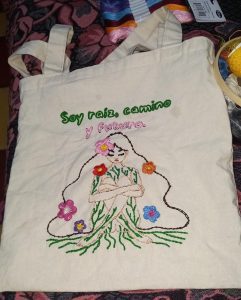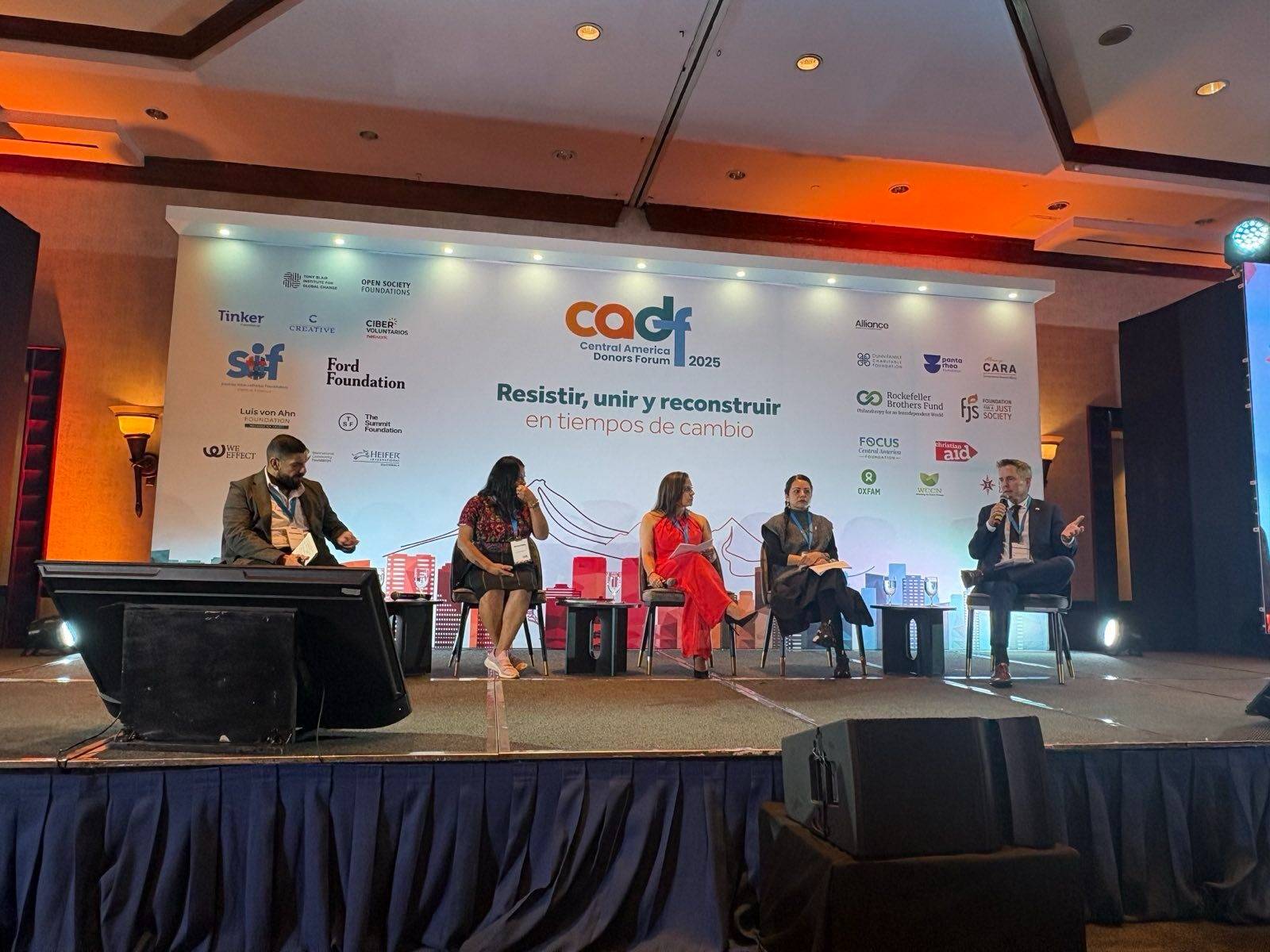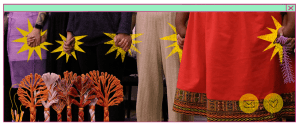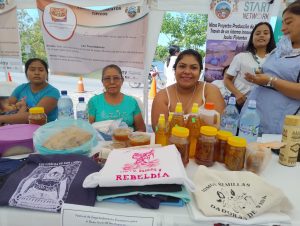
Feminist Reflections on the Sustainability of Social Movements in Central America

Table of Contents
- Financing conditions of possibility
- Trust as a political practice
- Time is powerful
- Sustainability as embodied practice
- Creativity for re-existence and regeneration
- Weaving sustainability in community
By: Miriam Alejandra, coordinadora de programas FCAM Foundation
In Central America, to speak of sustainability is to speak of persistence, regeneration, and political imagination.
It is not a neutral or technical idea, but one that flows through bodies and memories, through the collective ways of sustaining life with dignity in the face of uncertainty and risk.
At the Central American Women’s Fund (FCAM Foundation), we understand sustainability as political and emotional continuity: the ability of movements to reinvent themselves and continue to take shape , even when contexts conspire to make them disappear.
For more than two decades, we have been committed to a direct, flexible, multi-year support model that is based on trust, accompaniment, and a deep understanding of the realities that inhabit the territories.
This model seeks not only to finance projects, but to fund the very conditions that make collective action possible: the time, energy, rest, mental health, care, networks, and political reflection that allow life to persevere and flourish.
International Foundation, I participated in the panel “New perspectives to address the context of civil society financing”, alongside people with deep commitments to the region:
- Mariana (Luis Von Ahn Foundation)
- Arturo (Rockefeller Brothers Fund)
- Norma (El Directorio Gutemala)
- Pontus Rosenberg (Swedish Ambassador to Guatemala)
It was a valuable space to think about the present and future of financing.
From that dialogue, I’d like to share some reflections from the TOKTOK Foundation on what it means to speak of sustainability in Central America today: not as an administrative goal, but as a political commitment to sustain life, hope and collective action.
Financing conditions of possibility
Sustainability isn’t measured in indicators, financial statements, or reports. It’s embodied. It’s expressed in bodies, relationships, and our collective capacity to persist.
In Central America, emerging and grassroots groups sustain their activism in conditions of structural precariousness:
- Constant volunteering.
- High turnover.
- Endless days.
- Accumulated exhaustion of having to endure without support.
That’s why we at FCAM insist on the premise that financing basic costs and care is a political act.
We do not conceive funds for transportation, food, coordination time, childcare (to ensure caregivers’ full participation), internet or telephone access, stipends, and salaries as administrative costs; they are the minimum infrastructure of sustainability.
These are the material conditions that allow movements to exist, think, create, and accompany others.
We have learned that there is a vast difference between doing an activity and sustaining a political community. Activities end. Communities—when supported with resources, trust, and care—transcend project cycles and become territories of transformation.
We cannot expect structural change while the need to simply survive is foremost.
Financing the conditions of possibility, rather than only measurable results, means investing in a horizon where life, affection, and justice can continue to thrive.
Trust as a political practice
Feminist accompaniment is not just a method—it’s an ethos. To accompany means recognizing that groups and collectives in the region are already practicing transformative politics, even when their forms of organization don’t fit the molds of traditional cooperation.
Requiring legal status, accounting software, or formal hierarchies often excludes those who are inventing new ways to resist. That is why flexible funding and accountability measures that are proportional to each group’s capacities do not weaken transparency; they democratize it.
We believe sustainability is rooted in trust and in knowing that we are part of a network where accountability grows from connection, coherence, and reciprocity.
When financing becomes an act of mutual care, it stops being a transaction and becomes a relationship.
“Flexibility doesn’t mean a lack of transparency—it means trust and care.”
Time is powerful
Multi-year support is one of the most tangible ways to redistribute power.
It provides what is most scarce for movements: political time: time to get to know one another, identify shared goals and struggles, consolidate leadership, sustain communities, build alliances, nurture connections, and to live beyond the constant urgency of calls and reports. In contexts of repression, this time is also protection. It allows us to breathe, reorganize, and make decisions from a place of calm, not from a place of survival.
Sustainability isn’t just about resilience; it’s about being able to plan for the future when the present seems impossible.
Sustainability as embodied practice
Recent research by FCAM that engaged with women, trans, and non-binary people under 30 in Central America, we found a shared truth: sustainability isn’t decreed: it’s embodied.
Across the region, sustainability takes on many faces and meanings:
- For young feminists, it means something as basic and urgent as being able to meet without fear, in contexts where organizing itself can be risky.
- For Garifuna collectives, it means taking care of one another and strengthening security measures before going out to march—fully aware that defending territory and life exposes them to daily threats.
- For young Indigenous women, it emerges through historical memory, when their communities hear their voices—even without legal status or funding—because being heard is already a way of existing politically.
Meanwhile, in places where everyday life is expensive and activism often comes at great personal cost, sustainability means having just enough so that militancy does not become another burden on bodies and time.
Sustainability, then, is neither a single category nor a universal formula. It is an embodied experience—one that adapts to the contexts, urgencies, and possibilities of each territory, and that, in every case, names the collective effort to keep political action alive without ceasing to care for life.
Sustainability becomes a political and emotional experience: To continue to support each other, to heal together, to rebuild again and again. It’s not just about enduring; it’s about keeping alive the collective hope for a different world.
Creativity for re-existence and regeneration
In a context where repression and precariousness coexist, funding methods must be as creative as the struggles they sustain.
At FCAM Foundation, we understand that sustainability lives at the intersection of the financial, the political, and the emotional.
- Financial because without resources there is no autonomy or capacity for action. Multi-year and flexible support allows for agile planning, adaptation, and response.
- Political because resources should follow the agendas of movements, not the other way around. Funding also means naming power and redistributing it.
- Emotional and physical because caring for bodies and relationships means sustaining the movements themselves. There can be no impact without wellbeing.
Sustainability requires memory for learning, and conviction and creativity to create new ways of navigating complex contexts.
To achieve this, the collectives need funding for transportation, care, translation, breaks, and time to breathe and heal.
Care is not a luxury; it is political infrastructure.
Weaving sustainability in community
The future is not built in isolation. At a historic moment when even private foundations and bilateral agencies face pressure, censorship, and surveillance, it has become clear that the anti-rights wave permeates the entire global ecosystem.
It is no longer only about protecting rights defenders in the South; it is about reimagining how we work together to preserve dignity and collective action in a world determined to fragment us.
At the FCAM Foundation, we affirm with conviction that the future of cooperation lies in interdependence—not in competition, but in our capacity to act as an articulated body, sharing risks, care, and political responsibility.
Local funds, international foundations, and bilateral donors must recognize one another as part of a shared framework of justice, where trust and coherence are our most valuable common resources.
Funds such as FCAM Foundation serve as bridges between resources and communities, transforming funding into support, learning, and collective power.
Our work has been to navigate restrictive bureaucratic and legal frameworks so that our partners can continue advancing their struggles, expanding rights, and sustaining the organizational processes that make social change possible.
There is no need to invent new formulas. For centuries, communities have taught us how to resist, care for one another, and rebuild in the face of adversity.
What is urgent now is to learn from those practices and to bring them into the institutional spaces we inhabit: practices of mutual support, collective care, and political interdependence that give meaning to feminist cooperation.
Today, the deepest ethical and political challenge for those of us who finance is to accompany without directing, to share without dominating, and to care without controlling.
What is urgent now is to learn from those practices and to bring them into the institutional spaces we inhabit: practices of mutual support, collective care, and political interdependence that give meaning to feminist cooperation.
Today, the deepest ethical and political challenge for those of us who finance is to accompany without directing, to share without dominating, and to care without controlling.
Because the future of civil society lies not in donors operating in isolation, but in a living, interdependent ecosystem committed to justice, capable of creating continuity and hope even in the most uncertain contexts.


